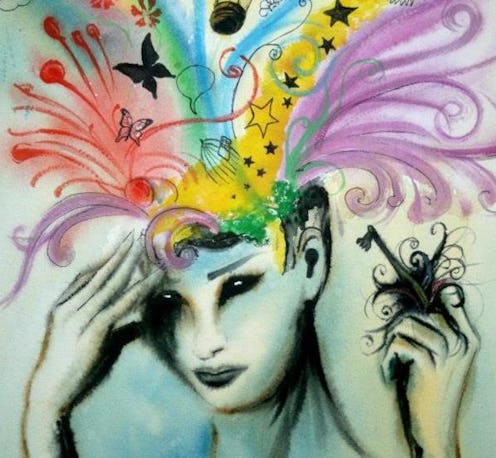
From a Palestinian refugee camp in Jordan, Laila Ajjawi is making street art that questions women's role in Middle Eastern society. Though her themes vary from horses to the plight of Palestinian refugees, a common theme throughout many of her pieces is women's empowerment.
In a recent profile on Cosmopolitan (which is an excellent read, by the way, so do take a look), Ajjaqi said that she has been painting and drawing since age five; however, she created her first piece of street art just one year ago through Women on Walls, a group of artists who use graffiti to advocate for women's rights, painting together to stay safe. The mural, "Look at my Mind," depicts a variety of colors, objects, and designs emerging from the top of a woman's head. She told Yahoo Travel that she hopes the image reminds men to view women as more than objects and reminds women to focus on developing their inner beauty.
In the same interview, Ajjawi said Jordan is a difficult country for women in many ways. Jordanian women do not have the same citizenship rights as men, which means that if they marry men who are not citizens, they cannot pass their citizenship on to their children. She also pointed out that marital rape is legal in Jordan, and rapists often escape punishment by marrying their victims. She tells Bustle over email that she views her art as a tool for drawing attention to these problems and believes that a picture is worth a thousand words.
Ajjawi has also painted portraits of women and girls who have survived gender-based violence on a mural in a Syrian refugee camp. Other murals, paintings, and drawings of hers depict strong-looking women, like the ones in different fighting poses in the mural below.
"The media is trying to provoke an idea that girls can't take control of their lives, that they can't be decision makers," Ajjawi told Cosmopolitan . She hopes that her art and the way she lives her life will challenge this notion and teach women to "express themselves without the limits that society or communities are trying to put them under." She also wants the 18 percent of Palestinian refugees in Jordan who live in camps, which are often stigmatized, to know "it doesn't matter where you came from but what you are going to be."
Swedish photojournalist Mia Gröndahl told Cosmopolitan that women street artists are rare in the Middle East, where it is often considered unsafe for women to enter public spaces, let alone be in the public eye. But Ajjawi doesn't let that stop her.
Head on over to Cosmopolitan to see the full feature about Ajjawi; it's well worth the read. You can also learn more about how Ajjawi uses art to advocate for equality in the video below.
Images: Courtesy of Laila Ajjawi; Cosmopolitan.com/YouTube